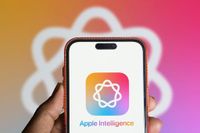Apple has unveiled a new method for training its AI, Apple Intelligence, aimed at enhancing performance without compromising user privacy. This announcement comes as Apple strives to improve its language model, which has faced criticism for its limitations on devices such as the iPhone, iPad, and Mac.
According to a blog post from the company, Apple is employing a unique technique that allows devices to compare synthetic data with local data, such as recent emails or messages, to refine its AI capabilities. This approach marks a shift from traditional AI training methods, which often rely on vast datasets collected from users.
In this innovative model, only a signal indicating the closest match is sent back to Apple, ensuring that personal data remains secure and private. For instance, when generating an AI-driven email summary, Apple creates various synthetic email scenarios that reflect common communication patterns. These scenarios include data points like email length, subject matter, and language style.
Users who have enabled device analysis receive these signals, known as embeddings. The iPhone then compares these embeddings to the actual email displayed, determining which synthetic version is the closest match.
Apple's commitment to user privacy is further demonstrated through its use of differential privacy, a technique that introduces random elements into datasets to prevent user identification. This allows Apple to analyze trends in how frequently certain synthetic integrations are selected without ever accessing individual users' emails.
Since implementing differential privacy in 2016, Apple has maintained a strong stance on user privacy, a principle that some engineers believe has hindered the progress of its voice assistant, Siri. Critics argue that Apple's avoidance of personal data exploitation has slowed its development compared to competitors like Google and Amazon, who have been less stringent in their data collection practices.
As Apple Intelligence becomes more widely available with the release of iOS 18.4, users of the iPhone 15 Pro, Pro Max, and iPhone 16 can now access features such as Genmoji, Image Playground, and visual intelligence. These features have been available to American users since autumn 2024.
In addition, ChatGPT has been integrated into Siri, although concerns have surfaced regarding privacy. A former Apple employee revealed that they were tasked with listening to and transcribing Siri audio recordings, prompting the Ligue des droits de l’Homme (LDH) to file a report and complaint with the Paris prosecutor's office on February 13, 2025, regarding the handling of these recordings.
In response to these concerns, Apple has published a statement clarifying its use of differential privacy within Apple Intelligence. The company emphasizes that protecting user privacy is a fundamental human right and asserts that it is possible to provide an exceptional user experience while safeguarding personal information.
Apple's statement elaborates on how differential privacy is utilized to protect customer data during interactions with Apple Intelligence. This technique prevents the identification of personal user information while allowing Apple to analyze synthetic data for improving its AI functionalities.
Furthermore, Apple has reported advancements in text generation capabilities through the use of synthetic data. This includes creating synthetic representations of emails written by users, enabling Apple Intelligence to generate summaries without ever accessing the actual content of those emails.
For features like Genmoji, Apple leverages popular user prompts from those who consent to share their data, enhancing response accuracy while ensuring that specific prompts cannot be traced back to individual users.
Despite these assurances, questions remain about whether Apple's lengthy explanations regarding its privacy practices will be sufficient to alleviate consumer concerns. As the company continues to navigate the balance between innovation and privacy, the effectiveness of Apple Intelligence in comparison to its competitors will be closely monitored.
As Apple strives to refine its AI capabilities while adhering to its privacy principles, the tech giant faces the challenge of keeping pace with competitors who may not prioritize user privacy to the same extent. The future of Apple Intelligence will depend not only on its technological advancements but also on how effectively it can communicate its commitment to user privacy in an increasingly data-driven world.





